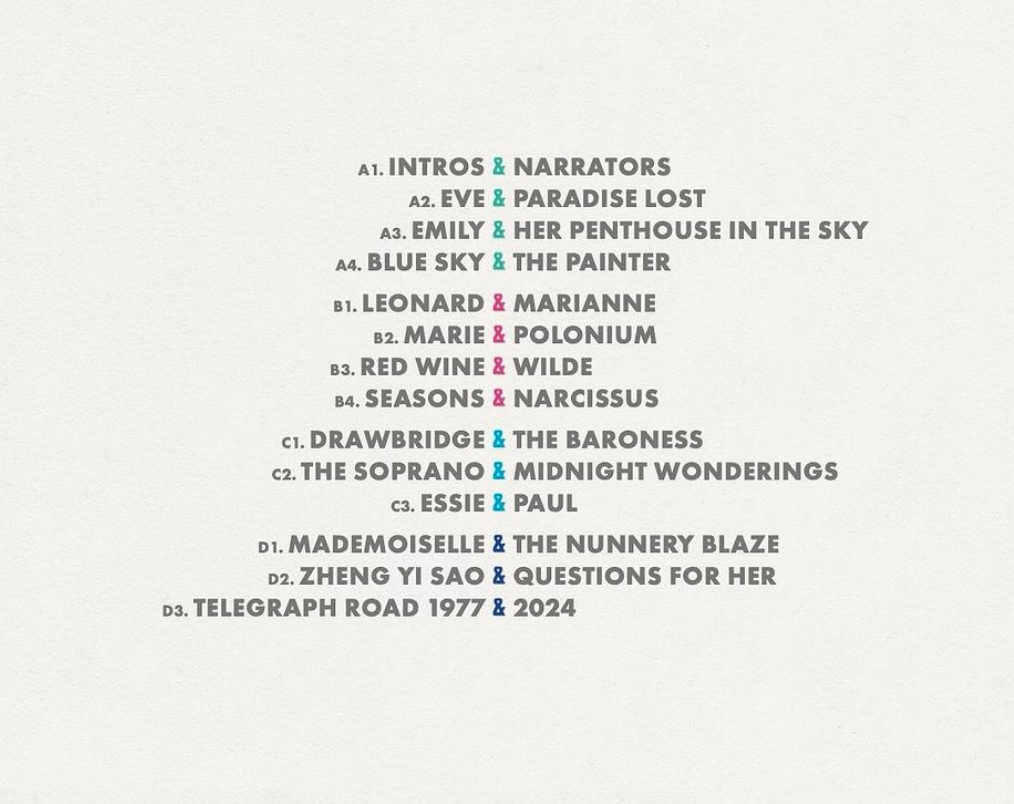
Bastille have unveiled their fifth album, &, a beautiful and ambitious synchrony of sound and storytelling. This 14-track record weaves together narratives of both real and imagined figures, such as the biblical Eve, the mythological Narcissus, the painter Edvard Munch and the lesser-known Chinese pirate Zheng Yi Sao. & is a treasure trove of lyricism and emotion, provoking reflection long after the final chord fades. It’s a haunting, indie-folk album, with sparse yet powerful arrangements that occasionally build into grand orchestral moments, alongside poetic lyrics and an overall atmosphere of melancholy.
Each song title includes an “&” — the ampersand symbol reflects the album’s thematic focus on how connections, stories, and lives intertwine to form a multifaceted whole. The album also creates new links between disparate ideas, showcasing a remarkable ability to reframe and reimagine familiar tales. & challenges its listeners to view these stories in a more nuanced, fresh light. The central theme seems to be giving voice to those who have been overlooked, retelling their stories with compassion and insight.
The album opens with “Intros & Narrators,” which marks one of the few times we hear Smith’s voice in the first person. The arrangement is intimate and minimal, with only a fingerpicked guitar and a subtle chorus of voices adding texture. Smith’s breathy vocals take the forefront, setting the tone for the album’s exploration of various characters, as he introduces himself as the “unreliable narrator,” guiding us through these lives, telling tales “more interesting” than his own.
The first track, “Eve & Paradise Lost,” explores the Fall of Man from Eve’s perspective. The song unapologetically focuses on Eve, never mentioning Adam by name, even though she speaks directly to him. Smith draws on literary and mythological sources for inspiration, and this track exemplifies how those influences shape his music. The lyrics subtly critique the unfairness of Eve taking the blame for the temptation, gently reminding Adam that they “both ate the fruit.” The acoustic guitar, combined with Smith’s tender vocals, complements Eve’s sorrowful, conflicted emotions. Eve is just one of several women in & who have their stories retold with sensitivity and nuance. Smith’s open, raw delivery captures her inner turmoil—her love, regret, and sadness.
Next, “Emily & Her Penthouse In The Sky” turns to the misunderstood American poet Emily Dickinson. The simple arrangement of fingerpicked guitar and keyboard allows Smith’s echoing vocals to take center stage. The narrator presents Dickinson as someone not “lost,” but as a creator who “makes worlds up in her mind.” The “penthouse” is a metaphor for her creative space—her mind—filled with poetry and isolation. The track’s blend of calming melodies and introspective lyrics makes it one of the album’s highlights, one to return to repeatedly.
The songs “Leonard & Marianne” and “Marie & Polonium,” about Leonard Cohen and Marie Curie, are lyrically compelling and musically ambitious. “Leonard & Marianne” introduces a grand symphonic element, with violins, cellos, and a choir enriching the track’s emotional depth. These lush additions bring a powerful, cinematic quality to the song, expanding the album’s sonic palette. “Marie & Polonium,” with its upbeat tempo and playful percussive melody, brings a refreshing burst of energy, offering a contrast to the more reflective moments on the album. This dynamic shift highlights the album’s versatility and ability to explore different moods and textures.
“Red Wine & Wilde” stands out as a deeply emotional highlight. Its tender, wistful melody and poignant lyrics evoke the spirit of American indie-folk artist Sufjan Stevens. This song delves into the complexity of Oscar Wilde, whose persona is often oversimplified as a gay martyr. Here, Wilde is portrayed in a more intimate, vulnerable light, asking his lover to “stay, make mistakes until the daylight” and “whisper those promises neither of [them] believe.” The restrained vocals and delicate string arrangements create a profound sense of intimacy, offering a grounded portrayal of Wilde as a man, not a myth.
“‘Mademoiselle & The Nunnery Blaze” brings to life the notorious 17th-century French opera singer Julie d’Aubigny. The track recounts the tale of d’Aubigny stealing a dead nun’s body and setting a room on fire to run away with her lover. Yet, instead of sensationalizing the story, Smith transforms it into a tender love song. The soft, yearning instrumental backdrop and the celestial imagery (“You’re the Earth, the moon, the stars”) evoke a sense of romantic defiance. The defiant line, “They locked you up in a holy place / I joined you anyway, let’s burn it down in flames,” captures the spirit of their forbidden love without trivializing the historical context.
The closing track, “Telegraph Road 1977 & 2024,” brings the album full circle. Based on a poem written by Smith’s father, with backing vocals from his mother, it’s the most personal song on the album. Its introspective tone offers a poignant conclusion to an album that, on the surface, is about others but also reveals much about the band’s own artistic sensibility. & invites its listeners to keep questioning, making connections, and embracing their humanity. It’s a beautiful, intricate album that weaves together threads of history, myth and emotion to create something new and meaningful.
Listen now





















